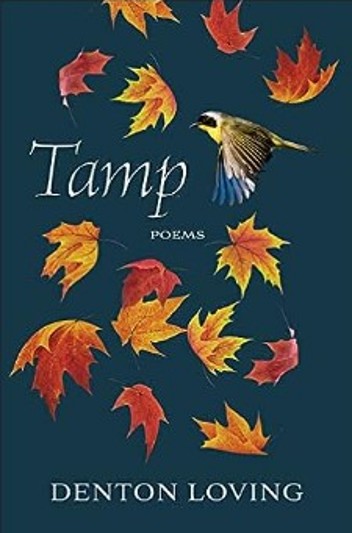
~ Delta Poetry Review ~
Denton Loving's Book Review by
Stephen Furlong
Loving, Denton.
Tamp: Poems. Mercer
University Press 2023. 64 pp. $20.00.
 In his opening essay, “The Lyric: A Personal
History” in Said-Songs:
Essays on Poetry and Place (Mercer University Press, 2021),
Jesse Graves states the following:
In his opening essay, “The Lyric: A Personal
History” in Said-Songs:
Essays on Poetry and Place (Mercer University Press, 2021),
Jesse Graves states the following:
“The
elegist confronts a seemingly impossible, certainly inevitable task:
the event of loss must be articulated and made comprehensible to the
audience, regardless of its magnitude or its proximity. Every
sufferer of loss must absorb or deny the event, must attempt—or
not—to work through it, and the elegist must carry this organic
process through an artificial gateway into the realm of the poem
itself, the poem in response to the loss.”
The operative word in Graves’ opening line is
confronts; the root of
which, confront, comes
from the French word
confronter, which means to border or to bound. It’s fitting, in
this sense of language, that grief and confrontation elicits a
connection to borders, because grief often seems to lock an
individual into themselves. As Graves writes “the event of loss must
be articulated and made comprehensible to the audience.” In his new
collection, Tamp, Denton
Loving regularly confronts grief, with results of tender, meaningful
poems that explore the ideas his poem “The Broken Man” closes
with—“the miracle and magic of / the dead breathed back to life.”
Tamp opens with “Hurtling,” a tender poem written in couplets, which help to further set the scenes of the book. The speaker, “five again,” is filled with anxiety, but the father’s comfort helps to “quiet the starlings in [my] belly.” This leads the heart of the poem to truly shine: “I know I am safe as long as he’s close.” Right from the first poem, it is clear that Loving’s collection concerns itself with safety and softness, despite the rough, unpredictable nature that hurtling would imply. It is through this softness that Loving’s poems shed light toward the direction of healing. Loving’s poems also explore the duality of physical and human nature, with many poems concerning farming and, to give a nod to Wendell Berry, “the care of the earth.” Poems like “There is a barn” and “Remembered by Name” are particularly reminiscent of Berry’s essays from The Gift of Good Land (North Point Press, 1981). The book’s theme central to unity and homage to the land aligns greatly with Loving’s landscape and farming poems.
I was also struck by the variety of influences in the collection:
Kevin Young, Judith Light, among others. Kevin Young’s influence
comes from a playful, tongue-in-cheek poem titled “Cows Don’t
Consider Oblivion” that alludes to Young’s poem “Oblivion.” Further,
Judith Light, well-known actress, especially known for being Angela
Bower in the ABC sitcom Who’s The Boss appears in a dream poem
simply titled “Upon Meeting Judith Light in a Dream.” That poem,
fused with pop culture, lines up with Loving’s vision of grief and,
once again, showcases a softness that proves enlightening.
These influences, much like the grief and the landscape it leaves in
its wake, help shape and cultivate poems that prove enduring and
encourage re-visitation. The poem modeled after the infamous
Augustus Saint-Gaudens statue is, in particular, one of the most
fascinating pieces of the book—its title is taken from the work
itself: “The Mystery of the Hereafter.”
“The Mystery of the Hereafter” is a poem that has haunted me since
my first reading. The poem is inspired by the Adams Memorial—a grave
marker in honor of Marian Hooper Adams and Henry Adams. It is housed
in the Rock Creek Cemetery in Washington, DC. Henry Adams’s ghost
stirs in the poem from the first line:
Do not call it grief.
“Grief” is what many reporters gave the name of the shrouded statue,
much to the irking of Adams. The poem is written in couplets that
suggest unity and togetherness, lending to the poem’s wielded power
until its close.
Another poem I keep going back to is “After My Father Died, I
Marveled” that opens:
“In the field / cattle grazed, unbothered by the coming / winter,
unfazed by the farmer’s absence.” The poem, formatted markedly
differently than those previous, focuses on quick, exacting images
of what is seen and
who is unseen. The poem,
much like the speaker, continues forward by filling absence with
sustenance: “I ached with hunger— / the drive-through ladies kept
taking / my orders, kept taking my money.” This ache is also
magnified by the drive “back and forth / from my house to my
father’s house even though / he wasn’t there.” There’s a great
strength to saying something in such direct language because through
that directness comes the gateway that Jesse Graves refers to. That
gateway leads to tenderness for those who came before, life for the
living, and grace for those who will come after. The poem ends with
a sense of lucidity that can only come from grief: “…but / I was too
spent / to cry or be angry / or feel anything except / the motion of
it all.”
Denton Loving’s Tamp
challenges the notion of elegy–the traditional view typically lensed
in three stages: lament, praise, and solace. Contemporary
collections surrounded by grief adhere often to a creative decision
to “make it bright,” but Loving reminds us that grief is tenacious
in its nature. It comes in poems like “Learning to Drive” and
“Riding Lawn Mower”—poems that fuse memory and life lessons-learned
philosophy that comes directly: living one’s life. These poems
embody the power of memory possessed by the living when honoring
those that have gone before us.
This line of thinking is especially indicative in “We Are Called to
Reinvent Ourselves”:
…I attempt
to retrace my path home, but the trail moves
or I do
and in a flash, I forget all I should know.
Further still, the poem continues:
You can spend a lifetime memorizing a place,
the trails and trees, the land’s lay and water’s flow
dividing your dreams from those
who walked there before you.
This poem is reflective of a great power in
Denton Loving’s poems: poems without flourishes, and the language is
direct and authoritative. That authority comes from Loving’s ability
throughout Tamp to fuse
memory and influence to honor both his land and his lineage.
Denton Loving's Interview
Denton Loving's
Poems and Bio
| Archive | Submissions | About | News |